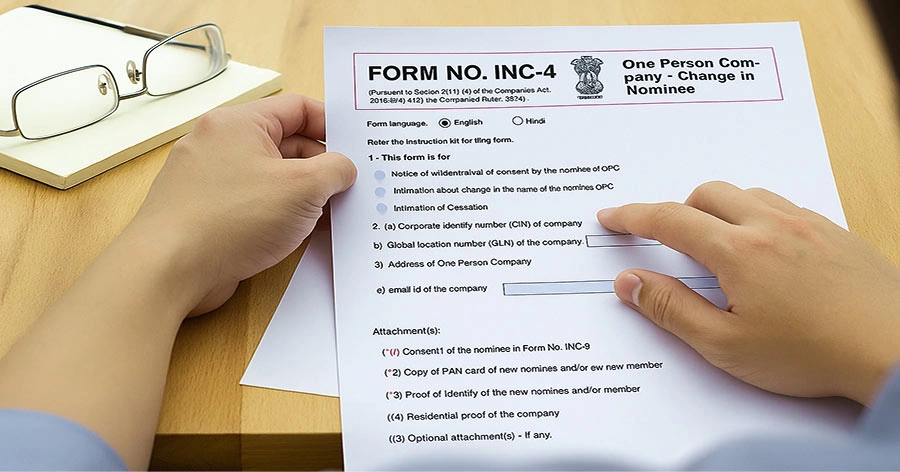
Starting your own business is exciting, but what if you don’t have a commercial office to run it from? Many aspiring entrepreneurs hesitate because traditional OPC registration usually requires a physical office address. The good news is that you can register an OPC without a physical address in India, giving you the freedom to start your venture without incurring heavy overheads or long-term leases.
A One Person Company (OPC) is a unique business structure under the Companies Act, 2013, designed for solo entrepreneurs. It combines the simplicity of a sole proprietorship with the credibility and legal protection of a private limited company. As the sole owner, you enjoy limited liability, a separate legal identity, and perpetual succession, while a nominee ensures that your business continues smoothly in the event of unforeseen circumstances.
By using alternatives such as a residential address or a virtual office, you can legally meet MCA requirements and incorporate your OPC quickly. This blog will guide you about the required documentation and compliance procedures to successfully register an OPC without a physical office in India.
What Does “Without a Physical Office” Mean for OPC Registration?
“Without a physical office” means that a business does not have a dedicated commercial space where operations are conducted daily. Entrepreneurs can still register a company using alternative addresses, such as a residential address or a virtual office.
| Type of Address | Description | Use Cases / Scenarios | Pros | Cons |
| Physical Office | A traditional commercial space where business activities take place. | Renting or owning an office in a business district. | Professional appearance, face-to-face meetings, credibility. | High cost, long-term commitment, and maintenance. |
| Residential Address | Using your home or a family member’s home as the official company address. | Living at home or using a family member’s residence. | Low cost, easy to set up. | Less professional image, not ideal for client meetings, may require landlord consent. |
| Virtual Office | A professional address provided by a service provider, often with mail handling and call forwarding. | Using a virtual office provider in a prime business location. | Affordable, flexible, provides professional business address, mail, and courier management. | Limited to correspondence, cannot hold regular physical meetings, may not suit some licenses. |
| Rented Office / Co-working Space | A flexible commercial space rented short-term or long-term. | Renting a small office or desk at a co-working space. | Professional setup, can meet clients, and flexible rental options. | Moderate cost still requires some commitment and setup. |
Using a Residential Address as the Registered Office
A residential address is one of the most common and cost-effective ways to register an OPC. The founder’s home or a family member’s home can serve as the official registered office for all legal and government correspondence.
Process Overview: The founder declares the residential address in the incorporation forms (SPICe+ Part B). All official communications from the Registrar of Companies (ROC), tax authorities, and legal notices will be sent to this location.
Documentation Required for Compliance: To satisfy the ROC, the following two documents are essential:
- NOC: This is a formal, signed letter from the property owner, even if the owner is the founder themselves. The No-Objection Certificate (NOC) explicitly states that they have no objection to the property being used as the registered office for the OPC.
- Recent Address Proof: A copy of a utility bill (e.g., electricity, gas, or telephone bill) or property tax receipt for the premises. Crucially, this proof must be in the name of the property owner and generally should not be older than two months from the filing date.
Benefits: This option offers maximum cost savings by eliminating commercial rent and provides a permanent, easily managed address for compliance.
Registering OPC Using a Virtual Office Address
A virtual office for OPC registration in India provides a professional business address without requiring a physical workspace. This solution is ideal for entrepreneurs who want a prestigious commercial address while operating remotely.
Process Overview: The OPC enters into a formal service agreement with a virtual office provider like RegisterKaro (often located in a prime business center). The company uses this commercial address for all registration and official correspondence, while the provider handles mail forwarding and other administrative support.
Documentation Required for Compliance: The legal documents confirm the OPC’s legitimate right to use the address for registration:
- Service/Lease Agreement: A notarized copy of the formal agreement between the OPC and the virtual office service provider.
- NOC: Provided by the virtual office company, confirming they authorize the use of their address for the OPC’s statutory registration.
- Address Proof of Premises: A copy of a recent utility bill in the name of the virtual office provider or the property owner of the commercial space.
Benefits: This grants the OPC professional credibility with a commercial address. It also offers flexibility, allowing the founder to operate the business remotely from any location.
What are the Legal Requirements for an OPC Without a Commercial Address?
Starting a One Person Company (OPC) in India requires understanding the legal framework, compliance rules, and operational requirements set by the Companies Act, 2013. An OPC is a unique business structure that allows solo entrepreneurs to enjoy limited liability while maintaining full control.
Below are the key legal requirements and rules every OPC owner should know:
Requirement of a Registered Office
Every OPC must have a registered office, which serves as the official address for legal notices and government communications. Key points include:
- Must be a physical address in the state where the company is incorporated.
- Can be a commercial or residential property with proper ownership or a rental agreement.
- Written consent from the property owner is mandatory.
- Used for official correspondence, invoices, and legal documentation.
Rules Regarding Address Proof and Display
The OPC must comply with certain rules to validate its registered office:
- Valid address proof includes utility bills, property ownership documents, or rental agreements.
- The company’s name and address must be displayed on the premises, website, letterheads, invoices, and official communications.
- Any change in the registered office must be filed with the Registrar of Companies (RoC) within 15–30 days.
Legal Requirements & Compliance
OPCs have specific operational rules to ensure legality:
- Only one member and one nominee are allowed; both must be Indian residents and citizens.
- OPCs cannot raise funds from the public or list on stock exchanges.
- Annual filings such as Form AOC-4 (financial statements) and Form MGT-7 (annual return) are mandatory.
- A nominee is required to ensure smooth succession in case of the owner’s death or incapacity.
- MCA allows a virtual office as a registered office only if it can receive official communications and is a legitimate commercial address. Not all virtual offices qualify; some MCA/RoC offices may question addresses without a physical setup.
What is Acceptable Under MCA / ROC for Registered Address?
The Ministry of Corporate Affairs (MCA) allows virtual office addresses as the registered office for OPCs and private companies if the following are provided:
- No Objection Certificate (NOC): Written consent from the property owner permitting the company to use the address.
- Lease / Rental Agreement: A legally valid agreement proving the right to use the space for company registration.
- Utility Bill: Electricity, water, gas, or landline bill showing that the property is active.
- Physical Verification: MCA/ROC may inspect the registered office to ensure authenticity.
- Display of Company Name and Address: Required on the premises, website, invoices, letterheads, and official correspondence.
Important: A virtual office is only legally valid if the documentation is authentic and verifiable. Submitting fake or incomplete documents can lead to incorporation rejection, penalties, or legal issues.
How Can You Register an OPC Without a Physical Office?
Many entrepreneurs struggle to register a company without a commercial office. The good news is that an OPC can be registered using a virtual office or residential address while following all legal requirements. Here’s the step-by-step process:
Step 1: Obtain a Digital Signature Certificate (DSC)
The first step in OPC registration is getting a Digital Signature Certificate (DSC). This certificate allows you to sign all registration documents online. To apply for a DSC, you need:
- Identification proof (like Aadhaar or PAN)
- Address proof
- A passport-sized photograph
Step 2: Apply for a Director Identification Number (DIN)
Anyone intending to act as a company director must obtain a Director Identification Number (DIN). This is a unique number issued by the Ministry of Corporate Affairs (MCA). The application is online and requires:
- Basic personal information
- Supporting documents (ID and address proof)
You must obtain a DIN to list yourself as a director in the company incorporation forms.
Step 3: Choose a Unique Name for the Company
Choosing a unique name is crucial for your OPC. The name must:
- Comply with MCA rules
- Not match any existing company names
You can also use our company name check tool to verify the availability of your chosen name.
Step 4: Prepare Required Documents
To register an OPC, you need several documents:
- Identity proof: Aadhaar card, PAN card, or passport
- Address proof: Utility bill, rental agreement, or virtual office NOC
- Registered office address proof: Use a virtual office or residential address if no physical office is available
Many virtual office providers also offer mail handling and proof of address services that can be used for registration.
Step 5: File the Incorporation Documents
Once all documents are ready, you need to file the incorporation forms online via the MCA portal.
- Complete the Simplified Proforma for Incorporating Company Electronically (SPICe) form
- Double-check that all details and documents are accurate to avoid delays
Step 6: Obtain a Certificate of Incorporation
After submission, the Registrar of Companies (ROC) reviews your application. If everything is correct:
- You will receive a Certificate of Incorporation
- Your OPC is legally formed
- You can then open a business bank account and begin operations
What Documents are Required for OPC Registration Without a Physical Address?
Registering an OPC without a physical office is possible, but certain documents are essential to comply with MCA/ROC requirements. These include:
1. Identity Proof of Director(s)
Documents such as PAN card, Aadhaar card, or Passport are required to verify the identity of the company’s director(s). These proofs are mandatory for obtaining DIN and filing incorporation forms.
2. Address Proof of Director(s)
A valid residential address proof is needed for all directors. This can include utility bills, passports, Aadhaar, or rental agreements. It ensures proper communication and verification by the ROC.
3. Registered Office Proof
Even without a physical office, your OPC must have a registered office address. Acceptable proofs include:
- Utility bills (electricity, water, or landline)
- Rental or lease agreement
- No Objection Certificate (NOC) from the property owner
Using a virtual office is acceptable as long as proper documentation is provided.
4. Documents from Virtual Office Provider (If Used)
If you opt for a virtual office, the provider should supply:
- NOC or consent letter
- Lease/rental agreement
- Recent utility bills (if applicable)
- Any official provider letters confirming the use of their address for company registration
These documents ensure that ROC accepts the virtual office as a legally valid registered address.
For a detailed list, check the required documents for OPC Registration.
What is the Cost and Timeline for Registering an OPC Without a Physical Office?
Here’s a quick overview of the estimated costs and timeline for registering an OPC without a physical office:
| Category | Details / Services | Approximate Cost (INR) | Estimated Time |
| Virtual Office Fees | NOC, lease agreement, utility bill, and mail handling | ₹1,000+ per month | Setup: 1–2 days |
| Digital Signature Certificate (DSC) | Required for signing documents online | ₹1,000–₹2,000 per director | 1–2 days |
| Director Identification Number (DIN) | Mandatory for all directors | ₹500 per director | 1–2 days |
| Company Name Reservation | MCA approval for a unique name | ₹1,000 (included in SPICe+) | 1–2 days |
| SPICe+ Filing (Company Incorporation) | Government fee for OPC registration | ₹500 | 7–10 working days |
| Professional / Legal Consultation | Optional assistance with documents & compliance | ₹5,000–₹15,000 | Depends on the service provider |
| GST Registration (optional) | For business operations | ₹0 (if self-filed) | 3–5 working days |
| Trademark Registration (optional) | Protect brand name/logo | ₹4,500–₹9,000 per class | 12–18 months |
| Total Estimated Cost | Combining essential fees & virtual office | ₹8,000–₹25,000 | 7–15 working days |
How to Choose a Credible Virtual Office Provider?
Selecting the right provider is critical for compliance and smooth operations. Key factors include:
- Legitimacy: Ensure the provider is registered, has a good reputation, and has verifiable client reviews.
- Proper Documentation: The provider should provide NOC, lease/rental agreement, and utility bills suitable for MCA/ROC submission.
- Prime Location: A well-known commercial address improves credibility with banks, clients, and government authorities.
- Services Offered: Mail handling, call forwarding, receptionist services, and occasional meeting room access are valuable.
- Compliance Support: Providers who assist with ROC/MCA documentation, digital notarization, and verification reduce the chances of registration delays.
- Flexibility & Cost: Choose a provider offering flexible plans (monthly/quarterly) to match your business needs.
Note: Services like RegisterKaro provide credible virtual office solutions across India, offering proper documentation, compliance support, mail handling, and prime business addresses suitable for OPC and company registration.
Conclusion
Yes, an OPC can be registered without a traditional office by using a residential or virtual address, allowing entrepreneurs to start quickly, save costs, and work flexibly.
Proper documentation, identity, and address proofs, NOC, lease/rental agreement, or utility bills are essential to meet MCA/ROC requirements. Using a credible virtual office ensures compliance and reduces the risk of delays or rejection.
Choose a reliable provider, like RegisterKaro, for verified virtual office addresses and complete legal support. Expert guidance helps ensure smooth registration and hassle-free operations, letting you focus on growing your business.
For personalized assistance and to start your OPC registration today, Contact RegisterKaro.
Frequently Asked Questions
Yes, you can register an OPC without an office address by using either a residential address or a virtual office. MCA allows alternative addresses if proper documentation, like NOC and lease agreements, is submitted. This ensures legal compliance while keeping overheads low. It’s ideal for startups and freelancers who work remotely.




